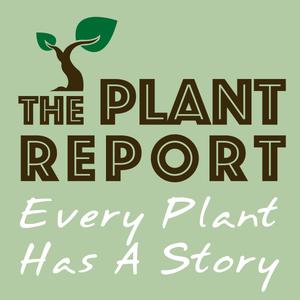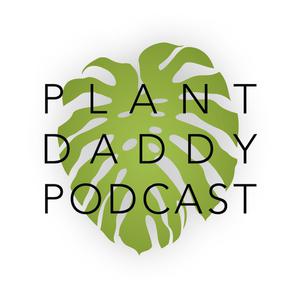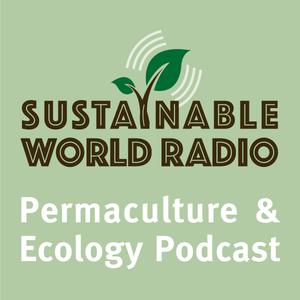
The Plant Report- Every Plant Has A Story
Jill Cloutier
Every Plant Has A Story
- 54 minutes 29 secondsThe Fabulous Fig
Episode 38: Our plant today is Fig and our guest is Dr. Lee Reich. Lee is a writer, horticultural consultant, and educator with graduate degrees in soil science and horticulture.
Lee is a big fan of Figs (Ficus carica) and in this episode we learn how to successfully propagate, grow, and harvest this ancient plant. Lee explains why it’s a challenge to know how many varieties of Figs there really are and shares his tips about how to keep your Fig trees healthy and happy.
Figs are unique in the fruit world. Did you know that when you eat a Fig, you aren’t eating a fruit? A fig is really a syconium (or synconium), a part of a stem that expands into a sac containing flowers. Luckily for us, Fig syconiums are so delicious!
Although, Figs are a true Mediterranean plant, they are adaptable and resilient. Those who live in colder climates, rejoice! You can successfully grow Figs and enjoy your own delicious syconiums. :) Lee shares some of his many methods for Fig growing in cold regions, including growing them in pots, overwintering them in greenhouses and basements, and pruning them so their low growing arms are very close to the ground. Learn more about these techniques in depth in Lee’s book Growing Figs in Cold Climates.
A former plant and soil researcher for the U.S. Department of Agriculture and Cornell University, Lee’s books include Weedless Gardening, Uncommon Fruits for Every Garden, and Growing Figs in Cold Climates. Lee wrote a syndicated gardening column for the Associated Press for nearly 30 years.
Lee’s farmden- his term for his more than a garden, less than a farm, piece of land, has been featured in many publications like the New York Times and Martha Stewart Living and has won awards from National Gardening and Organic Gardening magazines.
Visit Lee’s website at leereich.com to learn about Figs, fruit, gardening, soil, and more!
Lee was a guest on my other podcast Sustainable World Radio. Click here to listen to the episode Gardening Like Nature, where Lee discusses the art and science of building soil from the ground up and why he believes it’s important to pay attention to the top few inches of soil and let nature take care of the rest. Learn about mulch, the importance of compost, and why Lee loves to repurpose what others might call waste in his quest to improve soil fertility and grow vibrant and resilient plants.
16 May 2023, 3:54 pm - 55 minutes 12 secondsThe Wild World of Hops
Welcome to the world of Hops, Humulus lupulus.
In this relaxed conversation with organic farmer and Hops grower Acadia Tucker, we discuss this unwieldy and happy to be alive plant. We touch briefly on the history of Hops, which like its illustrious relative Cannabis, was once feared as a “wicked weed.” Now revered for its distinctive bitter flavor and potency as a nerve tonic, Hops is grown worldwide.
Acadia talks about the difference between a bine and a vine, how to propagate Hops, and why the European Corn Borer is such a tenacious pest for Hops crops.
We chat about what Hops needs to thrive, how to integrate Hops into your landscape as a home grower, and how It can grow so tall that farm workers in the past used to harvest it wearing stilts!
Acadia and I also discuss the chemical components of Hops and some of the nonalcoholic ways to utilize it including paper making, fiber, natural dye, and as a medicinal tea for relaxation and insomnia.
Acadia Tucker is a regenerative farmer, climate activist, and writer. Her books are a call to action to gardeners everywhere to get growing! Acadia is the author of Growing Good Food: A Citizen’s Guide to Backyard Carbon Farming and Tiny Victory Gardens: Growing Good Food Without a Yard. Acadia lives in Maine with her farm dog Nimbus where she grows Hops and other perennials. Learn more about Acadia Tucker at AcadiaTucker.com.
Other links mentioned by Acadia in this episode:
4 December 2021, 1:20 am - 1 hour 1 minuteSensational Spilanthes
Episode 36: Have you heard of Spilanthes? In this fun and informative interview with regenerative land designer, educator, facilitator, and Spilanthes fan Javan Bernakevitch, we discuss this unique plant.
An herbal ally with a long history of use for oral health and immune support, Spilanthes is known by a multitude of common names like Electric Daisy, Toothache Plant, and Party in the Mouth. Spilanthes is a a plant whose reputation precedes it. Chewing on the flowers produces a strong tingling and anesthetic sensation in the mouth- in Javan's words, "It's like feeling a 9 volt battery on your tongue."
Javan tells us why he holds Spilanthes in such high esteem and why he believes it's a must have in any herbal first aid kit. Javan shares his growing and harvesting tips and tells us how he makes and uses Spilanthes tincture.
Javan Bernakevitch founded and operates Permaculture BC, an education and community hub in British Columbia, Canada. The principle consultant at All Points Land Design, Javan works on small to large scale landscapes. Javan also works with individual clients providing assistance on life design- how to design your life to work with, not against, your nature.
For information on Javan's work visit: AllPointsDesign.ca and PermacultureBC.com.
Here are some other links for you:
Cosmic Bob's Plan for Your Life
18 June 2021, 7:11 pm - 1 hour 1 minuteWheat- An Ancient Grain for Modern Times
Episode 35: Did you know that Einkorn wheat is 27,000 years old? Wheat is one of the world's oldest grains and like it or love it, it’s been part of human life for thousands of years. Learn about this long revered and recently reviled plant with ancient grain farmer Larry Kandarian of Kandarian Organic Farms.
Larry talks about growing, harvesting, and utilizing different varieties of wheat, including Einkorn, Ethiopian Blue Tinge, Emmer Farro, and Spelt. We chat about his method of regenerative organic farming and learn why emulating a forest floor is one of the best ways to grow healthy soil and plants.
Larry also shares the exciting news of a new perennial wheat he is growing and explains why this crop could have major impacts on climate change.
Larry Kandarian is an organic farmer and ancient grains advocate who has been farming for over 50 years. Larry is a passionate land steward who grows over 1,000 different varieties of plants on his 130 acre small, but mighty farm in Los Osos, CA. A former mechanical engineer who worked on the space shuttle, Larry is on a mission to grow the grains in the most ecological way possible.
You can find out more about Larry and his grains at: Kandarian Organic Farms.
Larry also mentions the following:
Longevity Stew - his recipe for a delicious seasonal stew that helps him grow so many grains!
23 April 2021, 10:01 pm - 30 minutes 42 secondsTulsi Basil
Tulsi is a beautiful aromatic plant with strong medicinal qualities. In this interview with organic farmer Alena Steen of Night Heron Farm we learn how to propagate, grow, harvest, and utilize this lovely and revered plant.
Tulsi is native to India where it is known as Holy Basil. Tulsi is an adaptogen- a plant medicine that helps us with stressors of all kinds.
In this episode Alena shares her favorite ways to use Tulsi in tea, tinctures, herbal honey, and skin care. We learn about annual and perennial Tulsi, how to harvest and dry the leaves and flowers, and why Tulsi is an excellent ally for our times. We also talk about why Tulsi is Alena's number one herb to grow for beginning gardeners.
Alena Steen grew up in the deciduous jungles of the Southeast US and has spent the last decade as an organic farmer and native plant gardener. Alena and her partner Danny grow herbs and flowers at Night Heron Farm where they run an Herbal and Flower CSA.
Alena and Danny believe that growing and producing local medicine is their way to contribute to a more just and sustainable world, where healthcare is centered first within ourselves. They hope through their work to connect folks more firmly to the magic of plants.
Learn more at NightHeronFarm.org.
Note: Before consuming herbs, especially on a regular basis, be sure to research or talk to your doctor and make sure that the herb is safe for you. Tulsi may be contraindicated if you have low blood sugar or are on blood-thinning medications.
1 February 2021, 12:37 am - 50 minutes 9 secondsThe Happiness Tree: Albizia julibrissin
Episode 33: Albizia julibrisson is one of my new favorite new trees. Commonly called The Tree of Happiness, Persian Silk Tree, and Mimosa, Albizia is native to Asia and a member of the Fabaceae family. I love its pink puffball flowers, gorgeous fragrance, whimsical nature, and potent medicine.
To learn about Albizia, I spoke with Community Herbalist and Traditional Food Ways Educator Lindsay Kolasa.
Lindsay and I start the interview by acknowledging that in some areas, Albizia julibrissin can be a weedy invasive plant. Albizia is self seeding, thrives in disturbed soil, and has very viable seeds. So please be mindful of planting it- especially if you live in a place where it can easily spread and outcompete native plants. With this in mind, Lindsay and I talk about invasive plant medicine and why it's important to learn the traditional uses of these plants.
We then dive into Albizia's long history of medicinal use. Mentioned in the Shen Nong Ben Cao Materia Medica in the 700's, Albizia julibrissin was highly valued in traditional Chinese Medicine. Albizia's flowers and bark are useful in treating insomnia, depression, and anxiety. Albizia is a "calming spirit" herb and promotes feelings of well being, peace, and (you guessed it!) happiness.
Lindsay tells how to sustainably harvest both bark and flowers and prepare them for teas, infusions, and tinctures.
Lindsay Kolasa is originally from New Orleans and Mississippi. She has taught at large conferences, such as the Southeast Women’s Herb Conference and for small groups, such as feisty garden clubs. Lindsay also ran an apothecary in the red, clay hills of eastern Mississippi, where her family stretches back six generations.
To learn more about Lindsay, visit her website at LindsayKolasa.com.
You can read Lindsay's article about Albizia here.
11 August 2020, 3:00 am - 48 minutes 34 secondsThe Amazing Amaranth Family
Episode 32: Meet the broad and beautiful Amaranth family in this episode with farmer and seed saver Andrew McMillion. Andrew shares his experiences propagating and growing Amaranth and tells us about his favorite members in this low maintenance and resilient family including: Orach (Atriplex hortensis), Caucasian Mountain Spinach (Hablitzia tamnoides), Syrian Medieval Chard, and Strawberry Spinach (Blitum capitatum).
We touch on the fascinating history of this plant, why Andrew believes it's important to "sow your weeds", and how Amaranth provides him with food nine months of the year. If you're interested in learning how to save seeds, Andrew says Amaranth is a great family for apprentice seed savers to build a relationship with.
There's an Amaranth for every climate- just be aware that they are self seeding and some members of the family can become invasive.
Andrew McMillion works on his small farm in Norway where he stewards a large and growing collection of plants. Andrew is a Board Member and guild leader for several guilds in the Norwegian Seed Savers.
Learn more here:
Andrew(at)NorwegianSeedSavers.no
Listen to a previous interview that I did with Andrew:
Earth Care- How Connecting to Nature Can Change Your Life
25 July 2020, 11:19 pm - 57 minutes 14 secondsThe Mighty Oak
Episode 31: Journey into the world of Quercus, the amazing Oak. Horticulturalist Byron Joel is an avid Oak fan and shares his knowledge about Oaks from tiny acorn to robust tree.
You'll learn about what Oaks need to grow well, the beauty of Oak as a perennial staple crop, the three "fruits" of Oak, and some of the many uses of this iconic tree. Byron also talks about the Dehesa, the semi-domesticated Oak savannah and its high quality yields. We also discuss specific species of Oak, including lower tannin varieties.
Byron Joel is a Permaculture teacher and designer who is an avid Oak fan. Owner of Oak Tree Designs in Margaret River, Australia, Byron works internationally as both educator and consultant in Holistic Management, Natural Sequence Farming, Bio-dynamics, Natural Farming, the Regrarians Platform, and Restoration Agriculture.
You can read about Byron's new project Dehesa Australis here.
In this epsiode, Byron mentions research about implementing the Dehesa system in California. Here is a link: Mediterranean Oak Woodland Working Landscapes: Dehesas of Spain and Ranchlands of California.
Byron mentions two books: Oak: The Frame of Civilization by William Bryant Logan and The Woodland Way by Ben Law.
11 November 2019, 4:08 pm - 34 minutes 35 secondsNettle- The Prickly Medicinal Herb
Episode 30: If you've ever wandered into a patch of Nettle, you probably remember its ferocious sting! But, did you know that Nettle is a nutritional powerhouse and herbal medicine rock star? Renowned for its tiny hairs and formic acid bite, Nettle is a plant with many medicinal benefits. Nettle contains protein, calcium, iron, magnesium, zinc, chlorophyll, and Vitamins A, C, D, and B!
To learn about this medicinal herb that "bites', I speak with Western Clinical Herbalist Cheryl Fromholzer, owner and founder of of Gathering Thyme, a community herb shop, clinic, and education center in San Rafael, CA. I saw Cheryl speak at the Santa Barbara Plant Food Medicine Conference last year and was impressed by her knowledge of Nettle.
Cheryl fills us in on the many benefits of this tonic herb. Nettle has an alkalizing effect on tissue, can reduce allergy symptoms, alleviate fatigue, and help with skin problems like eczema.
Cheryl tells us how and when to harvest Nettle and what parts of the plant to use. We also discuss Cheryl's favorite recipes, including Nettle Infusion, Vinegar, and Pesto.
Nettle can also be used as a potent soil amendment and as farm yard fodder.
You can catch up with Cheryl at GatheringThyme.com.
In this interview, I mentioned that I would share a recipe for Nettle Beer, if our beer turned out. I'm happy to report that it did! We let it ferment longer than the recipe suggested, which resulted in a tastier beverage- that is, if you like the flavor of a woodsy, earthy Nettle Beer!
The recipe that we based our Nettle Beer on is found at Homestead Honey.
We did change a few things. We ran out of fresh Nettle (it doesn't weigh a lot!!) and ended up using about half dried Nettle. We also kept ours in our fermentation bucket for over a week before bottling it up. Once bottled, we let it sit out for another week or so.
3 May 2019, 11:10 pm - 50 minutes 45 secondsMeet the Geranium Family!
Episode 29: Robin Parer loves Geraniums. An avid horticulturalist, Robin started a nursery in 1983 with 32 Geranium plants. Thirty five years later, Robin's nursery contains over 650 members of the Geraniaceae Family. Robin has traveled through leech infested Australian swamps, explored Hawaiian craters, and climbed 14,000 feet to reach Andean lama pastures- all for her love of Geraniums!
In this episode, I speak with Robin Parer about the entire Geraniaceae Family: Hardy Geraniums, Pelargoniums, Erodiums,and Monsonias. Robin talks in depth about how to grow and propagate them, where they are found in nature, the mistaken identity of Pelargoniums, and why she has been entranced with this plant family for so long.
Robin Parer is the owner and operator of the Geraniaceae Nurseryin Kentfield, CA and the author of the book, The Plant Lovers' Guide to Hardy Geraniums. She is also one of the founders of the Bay Area Horticultural Society and has been featured in the New York Times, Sunset, and House and Garden Magazine.
31 August 2018, 9:02 pm - 25 minutes 37 secondsThe Lovely Loquat
Episode 28: Have you ever heard of Loquats? In this episode, farmer, educator, and author Ken Love talks about this sweet and prolific fruit tree.
Found throughout the world, Loquats (Eriobotrya japonica) are easy to grow and maintain. Also known as Biwa and Pipa, Loquats have a long and intriguing history and offer the home gardener an abundant source of delicious fruit with high levels of Vitamin A and Potassium.
Loquats are also powerful medicine. The leaves are used medicinally in teas and syrups to clear the lungs.
Ken tells us what Loquats need to thrive, how to prune them for high quality fruit production, and how to harvest them for longer shelf life and maximal nutrition.
Ken Love specializes in tropical fruit horticulture and grows more than 200 types of exotic fruits on his farm on the Big Island of Hawaii. You can learn more about Ken at his website HawaiiFruit.net or at HawaiiTropicalFruitGrowers.org.
13 April 2018, 11:41 pm - More Episodes? Get the App
Your feedback is valuable to us. Should you encounter any bugs, glitches, lack of functionality or other problems, please email us on [email protected] or join Moon.FM Telegram Group where you can talk directly to the dev team who are happy to answer any queries.
 My Favorite Murder with Karen Kilgariff and Georgia Hardstark
My Favorite Murder with Karen Kilgariff and Georgia Hardstark
 Plant Daddy Podcast
Plant Daddy Podcast
 Empire
Empire
 No Agenda
No Agenda
 Sustainable World Radio- Ecology and Permaculture Podcast
Sustainable World Radio- Ecology and Permaculture Podcast
 The History Chicks
The History Chicks